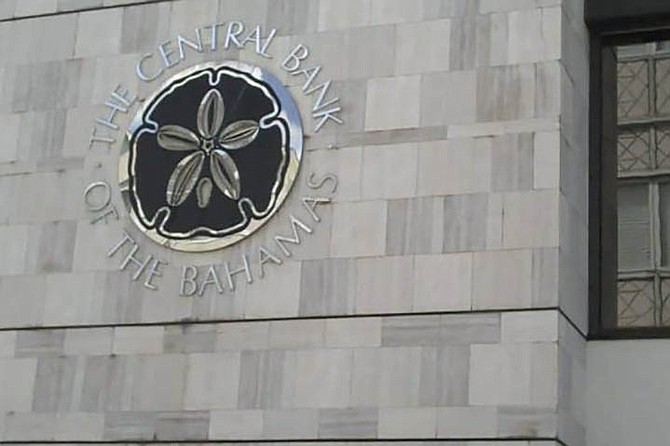By NEIL HARTNELL
Tribune Business Editor
nhartnell@tribunemedia.net
Hurricane Dorian may have rendered it somewhat academic, but the Central Bank yesterday affirmed the government hit its 2018-2019 deficit target by near-halving the "red ink" at $222.4m.
The banking and monetary policy regulator, unveiling its pre-Dorian August report on economic developments, said the Minnis administration achieved a $192.5m or 46.4 percent year-over-year reduction in the fiscal deficit in line with its stated Fiscal Responsibility Act targets.
While Dorian has now blown a hole in this goal, the Central Bank said the reduction was achieved by a $373.6m or 18.3 percent growth in total revenues to $2.416bn. This "outstripped" the $181.1m, or 7,4 percent, year-over-year growth in total spending to $2.638bn.
Total tax revenues increased by 14.7 percent, with value-added tax (VAT) ahead of prior year comparisons by 20.2 percent due to the rate hike to 12 percent. This beat the 10.6 percent jump in recurrent or fixed-cost spending.
"Total revenue gains were largely bolstered by the 4.5 percentage points increase in the VAT rate, which led to a $214.3m (31.5 percent) expansion in VAT receipts to $894.9m," the Central Bank said.
"Further, amid the reclassification of VAT on realty taxes to stamp taxes, financial and realty-associated stamp taxes rose more than two-fold to $225.3m from $109.5m in the comparable period of the previous fiscal year.
"Expenditure growth was due in large measure to a $232.6m (10.6 percent) rise in recurrent spending to $2.421bn. Specifically, purchases of goods and services - mainly related to the settlement of arrears - rose by $141.6m (31.5 percent). In addition, subsidies were higher by $64.9m (19.8 percent) and social assistance by $20.3m (12.3 percent)," the Central Bank continued.
"Further increases were also posted for current transfers, by $21.7m (16.8 percent), and interest payments by $15.8m (5.0 percent). In contrast, disbursements related to employee compensation fell by $17.6m (2.4 percent).
"Total capital outlays were reduced by $51.6m (19.2 percent) to $217.2m, attributed mostly to a $41.1m (18 per cent) decline in the acquisition of non-financial assets and a $10.4m (26.1 percent) fall-off in capital transfers."
Turning to the hotel industry, the Central Bank report said room revenue was up 29 percent for the seven months to end-July 2019 among key New Providence and Paradise Island hotels based on data from the Bahamas Hotel and Tourism Association (BHTA) and Ministry of Tourism.
"The average hotel occupancy rate rose by 9.9 percentage points to 82.9 percent for the month of July, as the number of room nights sold advanced by 16 percent," the Central Bank said. "Further, the average daily room rate (ADR) firmed by 2.9 percent to $258.87 per night, contributing to a 19 percent growth in room revenue.
"Over the seven-month period, the occupancy rate grew by 10.5 percentage points to 77.5 percent, while the number of room nights sold expanded by 19 percent. Further, the ADR (average daily room rate) advanced by 8.2 percent to $277.40, resulting in a 29 percent strengthening in room revenue."
As for vacation rentals, the Central Bank added: "The latest data from AirDNA revealed that total room nights sold improved by 49.1 percent in August over the same month in 2018, reflecting increased bookings for both hotel comparable and entire place listings within all of the major markets.
"However, pricing indicators varied as the ADR for entire place listings edged up by 0.4 percent to $403.31, while the ADR for hotel comparable listings decreased by 5.1 percent to $153.76. By island, ADRs for entire place listings across all of the major destinations, with the exception of Abaco, increased during the month, while for hotel comparable listings declines were registered across all the major markets, with the exception of Abaco and Grand Bahama.
"Over an eight-month period vacation rental sales grew by 30.4 percent in comparison to 2018, with all major destination groupings showing improvements. However, average nightly pricing for entire place listings fell by 1.4 percent, while that of hotel comparable accommodations decreased by 6.5 percent."





Comments
Porcupine 6 years, 4 months ago
Boy, that "less" red ink sure looked good to those finance gurus. So, just where did all that extra VAT money come from? That's right! Right out of the pockets of the Bahamian people. People who would have spent those dollars right back into the economy, creating ever more growth. But, nobody wants to talk about the damage VAT is doing to this country, along with the corruption involved with Customs Duty. The idea that this article is about what "was" is indicative of the shallow understanding of what an economy exists for in the first place. Dorian, while destroying many people's lives, homes and businesses, has done little damage to this country compared to the efforts of the MInnis and Turnquest and their foreign financier thinking that will keep Bahamians in chains for generations. Again, cudos to our educational system for keeping the country in the dark.
Sign in to comment
OpenID